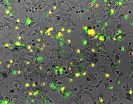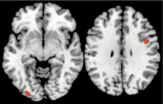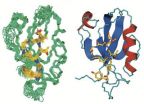The median survival for metastatic triple-negative breast cancer patients is historically nine months. However, results of a new phase II clinical trial conducted by researchers at Weill Cornell Medical College and reported in the Annals of Oncology shows if patients at high-risk of relapse with no current visible breast cancer are copper depleted, it results in a prolonged period of time with no cancer recurrence. In fact, only two of 11 study participants with a history of advanced triple-negative breast cancer relapsed within 10 months after using the anti-copper drug, tetrathiomolybdate (TM).
"These study findings are very promising and potentially a very exciting advance in our efforts to help women who are at the highest risk of recurrence," says the study's senior investigator, Dr. Linda Vahdat, director of the Breast Cancer Research Program, chief of the Solid Tumor Service and professor of medicine at Weill Cornell Medical College.
Dr. Vahdat says four of the study participants with a history of metastatic triple-negative breast cancer have had long-term benefit remaining disease free for between three and five and a half years.
"The anti-copper compound appears to be keeping tumors that want to spread in a dormant state," reports Dr. Vahdat, who is also medical oncologist at the Iris Cantor Women's Health Center at NewYork-Presbyterian Hospital/Weill Cornell Medical Center. "We believe one of the important ways it works is by affecting the tumor microenvironment, specifically the bone marrow-derived cells that are critical for metastasis progression."
In addition, study participants with other forms of high-risk for relapse breast cancers -- either stage 3 or stage 4 -- without evidence of disease after treatment have also fared well. The progression-free survival rate among these 29 patients in the study has been 85 percent, to date.
"As good as these interim findings look to us, we cannot talk about significant benefit until we compare TM treatment to other therapies," she says. Dr. Vahdat expects to launch a phase III randomized clinical trial in the near future.
This research is a report of the first 40 patients. The clinical trial, which began in 2007, has been expanded many times and now includes 60 patients, more than half of who have triple-negative breast cancer.
Deplete Copper to Prevent Cancer Spread
New discoveries in the science of metastasis and examination of the body's utilization of copper to promote cancer spread led to this clinical trial.
Investigators at Weill Cornell, including some of this study's co-authors, have contributed to the recent understanding of the role bone marrow cells play in promoting metastasis. They previously found that a collection of bone marrow-derived cells, which include VEGFR1+ hematopoietic progenitor cells (HPCs), prepare a site in distant organs to accept cancer cells. HPCs also recruit endothelial progenitor cells (EPCs), among others, to activate an "angiogenic switch" that establish blood vessels at the site to feed newly migrated cancer cells.
Breast cancer research studies conducted at Weill Cornell have also found that immediately prior to cancer relapse, levels of EPCs and HPCs rise significantly further, suggesting that the EPC target of the copper depletion approach is one that makes sense.
"Breast tumors want to move to specific organs, and these EPCs and HPCs cells leave a 'popcorn trail' for cancer cells to follow, as well as provide the building blocks for blood vessels to greet them as they arrive," Dr. Vahdat says.
Copper is critical to mobilizing these cells. Copper is essential to the metastatic process. It is a key component of enzymes that help turn on angiogenesis in the tumor microenvironment, and it also appears to play a role in directing cancer cell migration and invasion, according to researchers.
TM is a copper chelation compound used to treat Wilson's disease, a hereditary copper metabolism disorder, and has been studied in phase I and phase II clinical trials for a number of disorders. Animal studies have demonstrated that depleting copper decreases proliferation of EPCs, as well as blood vessel formation and tumor growth.
Dr. Vahdat's study is the first human clinical trial to utilize a copper depletion strategy to modulate EPCs in breast cancer patients with an extraordinarily high risk of relapse from hidden residual disease. Most of the studies in other solid tumors with visible advanced disease have been disappointing, say researchers.
Despite improvements in breast cancer therapy, there is significant risk of relapse in a high-risk subset of patients. The risk of relapse in stage 3 patients is 50-75 percent over five years, and patients with stage 4 breast cancer always recur. Triple-negative breast cancer patients have a poorer prognosis even when diagnosed in early disease stages.
"These triple-negative patients represent a substantial proportion of metastatic breast cancer patients," says Dr. Vahdat. "These are the patients that need the most attention, which is why we have focused most of the resources of our Metastases Research Program on this problem."
In the study, researchers found that 75 percent of patients achieved the copper depletion target using TM after one month of therapy, and that copper depletion was most efficient (91 percent) in patients with triple-negative tumors, compared to other tumor types (41 percent). In copper-depleted patients only, there was a significant reduction in EPCs, and the 10-month relapse-free survival was 85 percent. In addition, TM was found to be safe and well-tolerated in patients.
The study shows copper depletion appears to inhibit the production, release, and mobilization of EPCs from the bone marrow, leading to a suppressed angiogenic switch and tumor dormancy.
"There are a lot of cancer experts at Weill Cornell working very hard to understand this precise mechanism, define the clinical benefit in this ongoing copper depletion drug clinical trial, and determine its future study," says Dr. Vahdat. "Keeping cancer dormant is what we all want for our patients -- especially triple-negative breast cancer patients at highest risk of recurrence."
INFORMATION:
Study co-authors include Dr. Sarika Jain, Maureen M. Ward, Naomi Kornhauser, Dr. Ellen Chuang, Dr. Tessa Cigler, Dr. Anne Moore, Diana Donovan, Christina Lam, Marta V. Cobham, Sarah Schneider, Sandra M. Dr. Hurtado Rúa, Celine Mathijsen Greenwood, Dr. Richard Zelkowitz, Dr. J. David Warren, Dr. Maureen E. Lane, Dr. Vivek Mittal and Dr. Shahin Rafii from Weill Cornell; Dr. Jules Cohen from Stony Brook University Cancer Center, Stony Brook, N.Y.; and Steven Benkert from NewYork-Presbyterian Hospital.
The study was funded by the grants from the Anne Moore Breast Cancer Research Fund, Stephen and Madeline Anbinder Foundation, Rozaliya Kosmandel Research Fund, Susan G Komen for the Cure, New York Community Trust, Cancer Research and Treatment Fund, Manhasset Women's Coalition Against Breast Cancer and Berman Fund.
Weill Cornell Medical College
Weill Cornell Medical College, Cornell University's medical school located in New York City, is committed to excellence in research, teaching, patient care and the advancement of the art and science of medicine, locally, nationally and globally. Physicians and scientists of Weill Cornell Medical College are engaged in cutting-edge research from bench to bedside, aimed at unlocking mysteries of the human body in health and sickness and toward developing new treatments and prevention strategies. In its commitment to global health and education, Weill Cornell has a strong presence in places such as Qatar, Tanzania, Haiti, Brazil, Austria and Turkey. Through the historic Weill Cornell Medical College in Qatar, the Medical College is the first in the U.S. to offer its M.D. degree overseas. Weill Cornell is the birthplace of many medical advances -- including the development of the Pap test for cervical cancer, the synthesis of penicillin, the first successful embryo-biopsy pregnancy and birth in the U.S., the first clinical trial of gene therapy for Parkinson's disease, and most recently, the world's first successful use of deep brain stimulation to treat a minimally conscious brain-injured patient. Weill Cornell Medical College is affiliated with NewYork-Presbyterian Hospital, where its faculty provides comprehensive patient care at NewYork-Presbyterian Hospital/Weill Cornell Medical Center. The Medical College is also affiliated with the Methodist Hospital in Houston. For more information, visit weill.cornell.edu.
END





